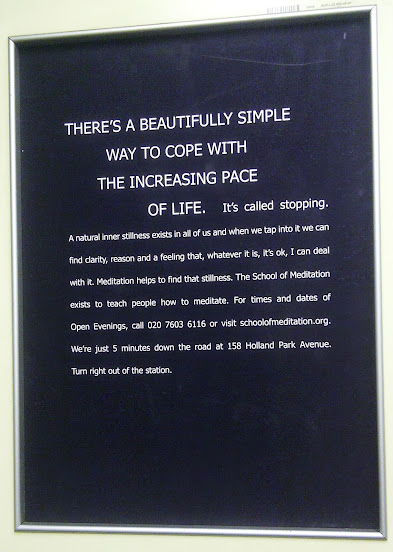Blogs inspired by the material taught at the School of Meditation, Holland Park Avenue, London; these notes are taken from the material taught at groups during early 2019…

Advaita?
“A longing inside the heart to know yourself or to be free of suffering must be there for anyone to realise the truth of what this ancient and practical philosophy is pointing towards” – Mooji
Unlike most popular methods of spiritual exploration, Advaita Vedanta does not proscribe tasks or impose a hierarchy of worthiness. It does not require adherents to attend a sacred building or listen to the sermon of a holy man. Advaita is more direct and places less emphasis on actions that are designed to satisfy the mind.
The mind wants to get things, to fathom things and see linear progression towards a goal, but Advaita is too simple for the mind to grasp. While the mind likes concepts, Advaita likes freedom and spontaneity.
“Freedom kills the conditioned mind” – Mooji
Not Meditation
The material at the School of Meditation seeks to identify potential obstacles to the enjoyment of freedom and spontaneity.
The material, comprised of spiritual and practical teachings, accompanies the practice of meditation. But the material of session four pointed out that sitting in a meditation posture is “not meditation”.
Meditation is when all feelings of separation are gone.
Strange Effort
Reciting the mantra is the “single stimulus” that enables meditators to access deeper, subtler levels in themselves. When thoughts carry us away, the mantra can be listened to.
It is a conscious effort to decide to be here now and not travel to the past or future. It is not the usual kind of effort, but an effort to be aware of life itself manifesting in us now.
In meditation, we can expand our attention to include everything and everyone, letting go of what we think we are. Meditation is really nothing but this. The material includes a quote from the Shankaracharya that when people let go of what they think they are and expanding their awareness, they are behaving “artistically”.
Artistic Effort
To observe is to become free of being a ‘doer’, a person who is anxious for action. Counter-intuitively, action can then be taken with ease, without the heavy burden of duty. No longer a dour doer, now artistic and efficient.
The mind demands we become the ‘doer’ again but that is because the mind can never be the observer. It cannot comprehend that which is doing the observing.
The mind cannot understand the ungraspable. But we can experience it…
Next time, part five
Tom Charles @tomhcharles
The material in this blog was inspired by the teachings at the School of Meditation, Holland Park Avenue, London, W11 4UH. The school opened in 1961 and was taken under the wing of Maharishi Mahesh Yogi, the Beatles’ meditation teacher, who introduced the school’s founders to Shri Shantananda Saraswati, Shankaracharya of Northern India. In a series of Q & As, the Shankaracharya provided answers to the questions of the visitors from London. These answers formed the basis of the school’s teaching material.






